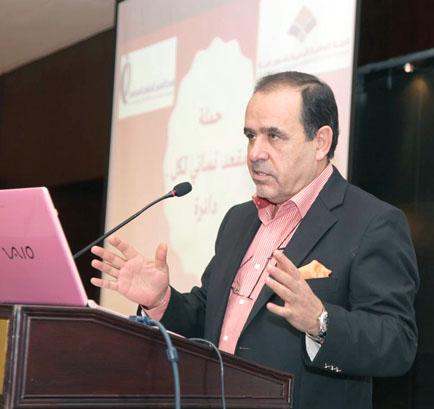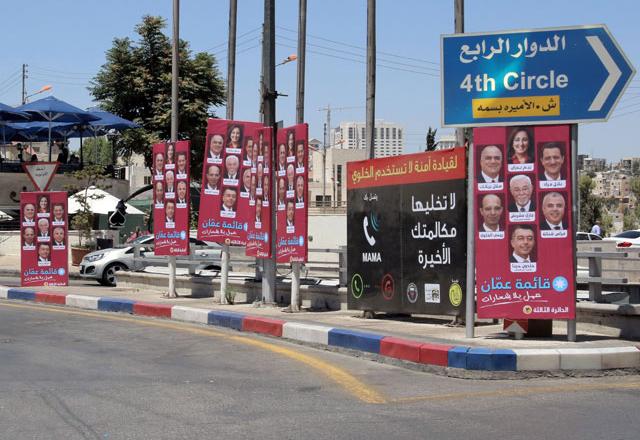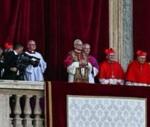You are here
Activists call for 17% women’s quota in Lower House
By Rana Husseini - Nov 30,2015 - Last updated at Nov 30,2015

Al Quds Centre for Political Studies Director Oraib Rantawi speaks to reporters on Monday (Petra photo)
AMMAN — A group of Jordanian civil society organisations on Monday said it will refer its demand to increase the number of seats for women in the Lower House to the Legal Committee for consideration.
The campaign aims to reserve a seat for women in each of the constituencies that will be designated in the 2015 draft elections law, the organisers said at a press conference on Monday.
The organisations represented include the Jordanian National Commission for Women (JNCW) and Al Quds Centre for Political Studies.
“We want to encourage more women to take part in the upcoming elections, because the ratio of women in the Lower House is currently 12 per cent, which is very low,” said the centre's director, Oraib Rantawi.
The campaign aims at increasing this percentage to 17 per cent, Rantawi told reporters.
As it stands now, he noted, there is only one woman MP each from Amman, Zarqa and Irbid, which are the three most populous governorates in Jordan.
Therefore, Rantawi explained, “we launched a campaign involving women leaders, activists, journalists, artists and public figures from the Kingdom's 12 governorates.”
“We collected 1,050 signatures that we plan to present to the Legal Committee at the Lower House when we submit our demand,” he said.
JNCW Secretary General Salma Nims said “the government disappointed the women’s movement because it committed to ensuring 20 per cent representation for women in Parliament by the year 2017.”
“The government is not committing to what it promised us and this was evident in the 2015 draft elections law,” she added.
Nuha Maaytah, a former senator and deputy, also held the government accountable for “not committing to women’s political rights”.
“Jordan has signed and complied with many conventions, but when it comes to conventions involving women, the government does not recognise or comply with them,” Maaytah argued.
Nadia Hashem Alul, former minister of state for women’s affairs, said such demands and comments on government commitments towards women’s rights should be sent to His Majesty King Abdullah.
“Civil society’s demands about increasing women’s political participation should be directed to the King as well, because we have witnessed several setbacks from decision makers when it came to increasing women’s representation in political life, especially the Lower House,” she stressed.
MP Najah Azzeh (women’s quota, Jerash) said she, with the support of other female deputies, secured the signatures of 64 deputies in support of the campaign’s demand when it is put through for discussion in the Lower House.
“We have the support of these deputies with regard to our demand to increase the ratio of seats for women to 17 per cent, and we will follow up with Al Quds centre and the JNCW to reaffirm the MPs’ commitments and maybe gain more signatures,” she said.
The elections bill is currently being examined by the Lower House Legal Committee.
Paragraph A of Article 8 of the elections bill reads: “The Kingdom is to be divided by a by-law into electoral districts for which 130 parliamentary seats will be allocated.”
In the government’s version of the draft law, the number of Lower House members was reduced to 130 from 150. The women’s quota of 15 seats remained the same.
Related Articles
AMMAN — A civil society coalition plans to organise a sit-in in front of Parliament to demand a seat for women in each of the constituencies
AMMAN — The women’s movement has expressed optimism that some female parliamentary candidates could clinch seats outside the 15-seat designa
AMMAN — Women’s rights activists on Thursday hailed the Lower House’s decision to designate a 15 per cent quota for women in governorate cou
















